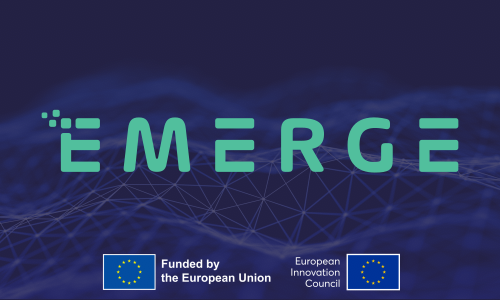30 January 2023


EMERGE Consortium secures grant awarded by European Innovation Council for the investigation of a new framework for AI collective awareness
Project scored first among those selected by the EIC’s Pathfinder “Awareness inside” Challenge and will receive a combined €2.8M grant from the European Commission
over the next 4 years.
Pisa, January 30th - How do robots in a collective know what the group as a whole is doing? How can connected devices make sense of the world around them with so many interconnections? How can a robotic arm composed of many independent parts understand how its body behaves as it reaches for an object?
When intelligence is distributed across many parts, be they robots, devices, or objects, it can be tricky for the bigger picture to emerge. Yet answering these questions is key to making collective systems easy to design, monitor and control. This is the goal of the EMERGE consortium composed of the University of Pisa (IT), Ludwig Maximilian University of Munich (DE), Delft University of Technology (NL), University of Bristol (UK), and Da Vinci Labs (FR).
The EMERGE project will deliver a new philosophical, mathematical, and technological framework to demonstrate, both theoretically and experimentally, how collaborative awareness – a representation of shared existence, environment and goals – can arise from the perceptions and interactions of individual agents, without leveraging a pre-existing common language between them.
This collaborative awareness envisioned by EMERGE will transform robotic systems, as well as all kinds of applications which involve providing a service over a loosely coupled collective of entities, both physical or virtual, such as Internet-of-Things (IoT) devices, smart services, biomedical nanodevices, and many others.
EMERGE has been awarded a highly competitive grant in the Horizon Europe funding programme. The project scored first among the 8 projects selected out of 34 proposals submitted to the “Awareness inside” EIC Pathfinder Challenges 2021 call. The partners will receive a combined €2.8M grant from the European Commission over the next 4 years. UK participants in EMERGE are supported by UK Research and Innovation.

EMERGENT AWARENESS
Humans and other biological agents can effectively move in new environments, navigate previously unseen situations, and intuitively coordinate through complex social interactions.
From the moment they enter a room, two people charged with moving a table have at their disposal, through their senses, an abundance of information. They are aware of their own body, their surroundings, as well as of each other and the table. And, as soon as they are aware of their goal, with little to no explicit communication, they can integrate all this data – these individual, or local, awareness states – and cooperate to solve the problem and move the table to a new place.
Artificial intelligence nowadays enables the translation of isolated local awareness states from biological to artificial agents using information about the environment which can be collected from mechanical (contact, vibration, collision, etc.), and electromagnetic (radio, infrared, visible light, etc.) stimuli.
However, the cooperation among those units is often dependent on some kind of central processing unit which collects that information and establishes a centralised awareness which distributes commands to each unit. Although useful, this process allows for very specific and previously programmed situations to be navigated and problems to be solved.
For artificial agents to be able to act in the unstructured conditions that the real-world demands, a new concept of collaborative awareness is needed. EMERGE’s goal is to establish, analyse, implement and test a new artificial intelligence framework that allows this collaborative awareness to emerge from the interplay of multiple individual units of local awareness. This collaborative awareness becomes an emergent process supporting complex, distributed, and loosely coupled systems capable of a high degree of collaboration, self-regulation, and interoperability without predefined protocols.
EMERGENT INNOVATION
EMERGE will implement a clear research-to-technology pathway to surpass limitations and barriers of the current state-of-the-art multi-agent collaborative systems, with potential to produce breakthroughs and open new markets in the next generation of robotic systems.
For that, the Consortium will focus on three use cases. The first use case is modular soft robots – self‐assembling, repairing or replicating robots made from soft materials which offer high freedom of movement, even in confined spaces, and better manipulation of delicate objects. In these robots, the body formed by a physically distributed collective needs to self-organise to account for the dynamic addition of components. The second use-case is robotic swarms – groups with a large number of robots whose behaviour arises from the interactions between themselves and with their environment. This is an example of a large-scale minimal collective where agents need coordination to achieve a collaborative goal. Finally, the third use case is collaborative robots, or cobots – robots interacting in direct contact with, or in close proximity to, humans. These represent a closer-to-market use case where interoperability is currently a significant barrier.
While robotics provides the perfect testing ground for this new framework, EMERGE also envisions impact in areas such as Internet-of-Things (IoT), smart cities and transportation, microservice-based information and communications technology (ICT) systems, and biomedical nanodevices, among others.
ABOUT THE PARTNERS
University of Pisa
University of Pisa is one of the most renowned educational institutions in Italy, with twenty departments and high level research centers in agriculture, physics, computer science, engineering, medicine and veterinary medicine. Famous alumni of the university include Galileo Galilei, the founder of modern science, the Nobel prize winners Enrico Fermi and Carlo Rubbia, and holders of the Fields Medal for Mathematics, Enrico Bombieri and Alessio Figalli.
Contact Details
Davide Bacciu, Associate Professor at the Computer Science Department and lead of the Pervasive Artificial Intelligence Laboratory
davide.bacciu@di.unipi.it
www.unipi.it
Delft University of Technology
Delft University of Technology in the Netherlands (TU Delft) is a modern university with a rich tradition. Its eight faculties and over 30 English-language Master programmes are at the forefront of technological development, contributing to scientific advancement in the interests of society. Ranked among the top universities of technology in Europe TU Delft’s excellent research and education standards are backed by outstanding facilities, research institutes and research schools.
Contact Details
Cosimo Della Santina, Assistant Professor at Cognitive Robotics (CoR)
c.dellasantina@tudelft.nl
www.tudelft.nl
University of Bristol
University of Bristol is internationally renowned due to its outstanding teaching and research, its superb facilities and highly talented students and staff. We are dedicated to academic achievement at the highest levels across a broad range of disciplines, supporting both individual scholarship and interdisciplinary research.
Contact Details
Sabine Hauert, Associate Professor of Swarm Engineering
sabine.hauert@bristol.ac.uk
www.bristol.ac.uk
Ludwig Maximilian University of Munich
Ludwig Maximilian University of Munich is one of the most renowned universities in Europe. Almost 50,000 students, 14 percent of them from abroad, currently take advantage of the broad range of subjects with 150 offerings from the humanities and cultural studies to law, economics and social sciences, medicine and the natural sciences.
Contact Details
Prof. Dr. Ophelia Deroy, Chair and Head of Philosophy of Mind/CVBE
ophelia.deroy@lrz.uni-muenchen.de
www.lmu.de
Da Vinci Labs
Da Vinci Labs is a research and incubation structure inspired by Leonardo da Vinci. Its interdisciplinary and humanistic approach aims to respond in a competitive way to the ecological challenges of tomorrow, and to bring out the future champions of deeptech, in particular in the field of quantum technologies, artificial intelligence and synthetic biology. To do this, Da Vinci Labs participates in European collaborative research projects and builds a technological infrastructure in Touraine which will be made available to researchers and entrepreneurs ready to tackle our major societal challenges.
Contact Details
Xavier Aubry, Managing Director
contact@davincilabs.eu
www.davincilabs.eu


